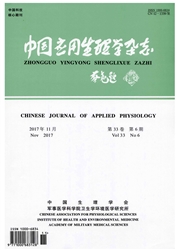

 中文摘要:
中文摘要:
目的:探讨白头翁汤治疗炎症性肠病的分子机制。方法:40只Wistar雄性大鼠随机分为5组(n=8):正常对照组、模型组、模型+阳性对照组(美沙拉嗪)、模型+中药治疗组,中药治疗组又分为中、高剂量组。阳性对照组、中药治疗组分别灌胃给药。疗程结束后取大鼠结肠组织利用免疫组织化学、Western blot等方法检测Smad7及p-Smad3在各组中的表达变化。结果:模型与组相比较,阳性药物及中药组尤其是高剂量组可有效抑制Smad7的表达,同时增强p-Smad3的表达。结论:白头翁汤可能通过激活TGF-β1/Smad3信号通路从而发挥了对炎症性肠病中的抗炎作用。
 英文摘要:
英文摘要:
Objective: To investigate molecular mechanisms underlying in the treatment of inflammatory bowel disease by Pulsatilla decoction.Methods: Wistar male rats were randomly divided into control group,model group,model + positive control group(mesalazine),traditional Chinese medicine treatment group,in addition,the Chinese medical treatment group was divided into middle and high dose group(n=8).Intragastric administration was used in the positive control group and traditional Chinese medicine treatment group.The expression of Smad7 and p-Smad3 in the colons were detected by immunohistochemistry and Western blot.Results: Compared with the model group,positive medicine and traditional Chinese medicine group,especially high-dose group,could effectively inhibit the expression of Smad7,while enhancing the p-Smad3 expression.Conclusion: The activation of TGF-β1/Smad3 signaling pathway may be the molecular mechanism underlying in the anti-inflammatory effect of inflammatory bowel disease by Pulsatilla decoction.
 同期刊论文项目
同期刊论文项目
 同项目期刊论文
同项目期刊论文
 期刊信息
期刊信息
